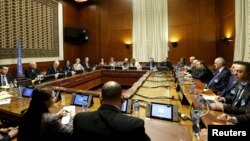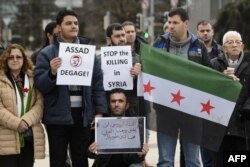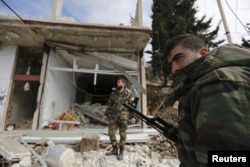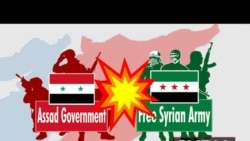U.N. officials in Geneva went ahead with peace talks Friday on ending the war in Syria, despite a boycott by the main Syrian opposition group.
The talks started with a meeting at the U.N. offices in Geneva between U.N. Special Envoy to Syria Staffan de Mistura and a Syrian government delegation headed by the Syrian ambassador to the U.N., Bashar Jaafari.
After the meeting, de Mistura told reporters he hoped to meet with representatives of the opposition group, the High Negotiations Committee, on Sunday.
"I have good reasons to believe that they are actually considering this very seriously, and therefore to be in a position on probably Sunday, to actually start the discussion with them, in order to be able to proceed with the intra-Syrian talks," de Mistura said.
The group, which has been meeting in Riyadh, said it would send a small team of representatives to Geneva late Saturday to talk with U.N. officials, but “not to negotiate.”
The HNC had earlier said it would not join the negotiations after its demands were not met for an end to airstrikes on civilians by the Syrian government and Russia and a lifting of the sieges in areas they control.
On Friday, the group said it decided to send a delegation after receiving “assurances.” A spokesperson gave no details of what those assurances were.
U.S. Secretary of State John Kerry said in a statement, "The United States welcomes the important decision by the High Negotiations Committee of the Syrian opposition to attend negotiations hosted by the United Nations in Geneva."
The talks are the first attempt at peace since negotiations collapsed in 2014.
Difficult process
The civil war in Syria has dragged for nearly five years, killed a quarter-million people and displaced millions more. The conflict has also seen the birth of the Islamic State militant group and triggered a massive wave of refugees to Western Europe.
The battles in Syria have intensified since September, when Russia began airstrikes in support of President Bashar al-Assad, countering the efforts of opposition groups supported by the United States, some members of the European Union, Turkey and Saudi Arabia.
The complicated backdrop makes the peace process especially difficult.
With Russian support, Assad’s forces have made significant gains. Analysts say the government has little incentive to negotiate with an opposition that is weak and fractured.
Even with the opposition joining the talks, analysts are pessimistic. Nadim Shehadi, director of the Fares Center at the Fletcher School of Law and Diplomacy in Boston, sees little chance of success.
“We are pressuring the opposition to prove that they are united, coherent, that they have a strong leadership and that they have a vision and a policy and a certain consensus on what the future will be, and I don’t think they do," he said. "I don’t think they will in the near future, and I don’t think they can.”
The talks had been set to begin on January 25, but discussions about who should represent the opposition delayed them to Friday.
WATCH: Syrian Civil War explained

















